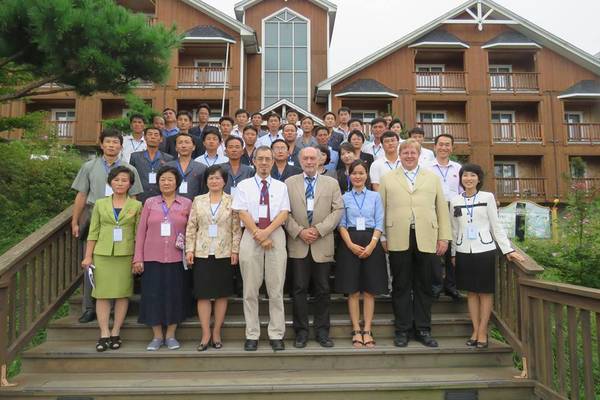Seminar in Samilpo (Kumgangsan) about wetlands and the Ramsar convention
Group photo of participants
Lakes, rivers and wetlands have important economic, ecological and cultural functions: fish and other products are important for local livelihood, wetlands are important habitats, they can be important for disaster protection (e.g. protect against flooding) and they are often of great cultural importance, inspiring artists and poets. At the same time, for long they were deemed wastelands, and in particular in Europe and Asia in the last century more than 70 percent of wetlands were lost to development. Therefore, 1971 in Ramsar (Iran) states (by now 169) concluded an agreement to protect and use sustainably (“wisely”) wetlands.
This is the background of a seminar of Hanns Seidel Foundation together with the Ministry of Land and Environment Planning (MoLEP) and the Ramsar convention in (North) Kosong at the Kumgang mountain. 41 participants from the MoLEP, as well as local and national tourism managers, participated in the seminar.
The seminar started with introductory speeches of Ri Kyong-Sim, Director General in the MoLEP, Lew Young, Senior Regional Advisor for Asia-Oceania of the Ramsar convention as well as Willi Lange, head of the Northeast Asia department at Hanns Seidel Foundation. Afterwards, three presentations by Dr. Bernhard Seliger of HSF Korea (about the wetland protection projects of HSF in Korea), Lew Young (about the Ramsar convention) and Solongo Khurelbataar (Regional officer for Oceania of the Ramsar Convention, on the principles and criteria of the selection of Ramsar sites) followed.
As part of the tourism strategy for the Wonsan-Kumgangsan Special tourism zone among others the introduction of eco-tourism tours is planned. Samil-Po is traditionally important as a wintering site or resting site during migration for diverse endangered species like Mandarin ducks, Red-crowned cranes, mute swans and whooper swans. After the presentations small groups discussed the possibility of registration of Ramsar sites in DPR Korea.
After the seminar a field visit of Samil-Po and Haekumgang, where the Kumgang mountains reach into the sea, took place. Experts discussed possibilities of sustainable development of the region.

